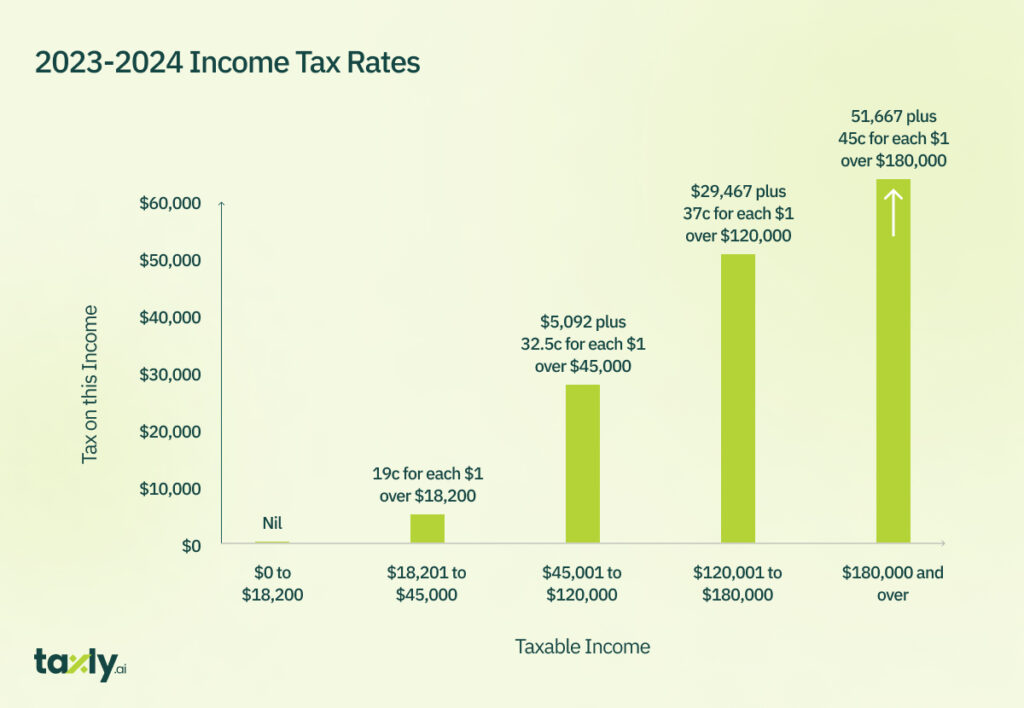What is income tax, and what is the purpose of income tax in Australia? Let’s find out in this blog!
What is Income Tax?
Income tax is a compulsory financial charge imposed by the government on an individual’s earnings, profits, and other sources of income. It is a key component of government revenue and is used to fund public services and programs.
Purpose of Income Tax in Australia:
Government Revenue:
Income tax is a significant contributor to the Australian government’s revenue. In the 2019-2020 fiscal year, individual income tax accounted for around 47.2% of total tax revenue. [1]
Public Services and Infrastructure:
Income tax funds vital public services such as healthcare, education, and infrastructure projects. For instance, the revenue supports the Medicare system, ensuring accessible healthcare for Australians.
Progressive Equity:
Australia’s progressive income tax system ensures that those with higher incomes pay a proportionally higher tax rate. This progressive approach contributes to social equity.
Social Welfare Programs:
Income tax revenue is channeled into social welfare programs, including the Age Pension and unemployment benefits. This aids in providing financial assistance and support to vulnerable individuals.
Suggested Read: What is A Superannuation? [Explained]
Economic Stability:
During economic challenges, the government may use income tax measures for economic stimulus. In 2020, Australia implemented tax cuts to boost consumer spending and support businesses during the COVID-19 pandemic.
Environmental Initiatives:
Income tax policies may include incentives for environmental sustainability. For instance, tax breaks are offered to individuals and businesses investing in renewable energy projects.
International Relations:
Australia engages in international efforts to combat tax evasion and avoidance. The country has a network of tax treaties to address cross-border taxation issues and promote fair practices.
Small Business Support:
The Australian government often uses income tax measures to support small businesses. Tax concessions and incentives are implemented to foster entrepreneurship and economic growth at the grassroots level.
Budgetary Management:
Income tax revenue plays a crucial role in budgetary management. It allows the government to allocate funds strategically across sectors and respond effectively to economic challenges.
Who Pays Income Tax?
Working Individuals:
Wage earners, professionals, and self-employed individuals pay income tax based on their earnings.
Suggested Read: 10 Self-Employment Tax Deductions and Benefits for Australians
Businesses:
Companies and sole traders are subject to corporate income tax on their profits.
Investors:
Individuals earning dividends or capital gains from investments may be liable for income tax.
When Do They Pay It?
Annually:
In Australia, individuals generally file income tax returns annually by October 31. The tax year runs from July 1 to June 30.
Quarterly:
Businesses may pay income tax quarterly, especially if they have a significant tax liability.
Key Things to Know about Income Tax in Australia:
Tax Deductions:
Individuals and businesses can reduce taxable income through deductions, such as work-related expenses or business costs.
Goods and Services Tax (GST):
Income tax is common in Australia. You may also need to pay Goods and Services Tax (GST) on goods and services.
Suggested Read: Australian Goods and Service Tax [EXPLAINED]
Tax Offsets and Credits:
Tax offsets, like the Low and Middle Income Tax Offset (LMITO), can directly reduce the amount of tax payable.
International Income Tax:
Tax treaties and regulations address international aspects, preventing double taxation and ensuring fair treatment of foreign income.
2023-2024 Income Tax Rates:

These are marginal tax rates and apply to different portions of an individual’s income. For instance, someone earning $60,000 doesn’t pay 32.5% of the entire amount, only on the income between $45,001 and $60,000.
Medicare Levy:
In addition to income tax, a Medicare Levy is levied at 2% of taxable income to fund the healthcare system.
Threshold Adjustments:
Income tax thresholds are periodically adjusted. For instance, the threshold for the 32.5% tax rate was increased to $120,000 for the 2020-2021 financial year.
Bracket Creep:
Bracket creep occurs when inflation pushes incomes into higher tax brackets. Governments may adjust thresholds to address this issue.
Different Rates for Companies:
Companies in Australia are subject to a flat federal corporate tax rate, which was 30% for most companies in the 2023-2024 financial year. It does not apply to small medium-sized companies. [2]
Regular Updates:
Tax brackets and rates are subject to regular updates by the government, and taxpayers should stay informed to ensure accurate calculations.
Methods to Pay Income Tax:
Online Filing:
Individuals and businesses in Australia can conveniently file their income tax returns online through the Australian Taxation Office (ATO) website using platforms like myTax.
Suggested Read: How to Avoid Contribution Tax – ATO Tax Threshold [Updated 2023-24]
Tax Agents:
Many individuals opt to use registered tax agents who provide professional assistance in preparing and lodging tax returns.
Payment Methods:
Payment methods include electronic funds transfer (EFT), credit/debit card, and, in some cases, deductions directly from wages (PAYG).
Installment Plans:
The ATO offers installment plans for those who may struggle to pay their tax bill in one lump sum.
What is the meaning of income tax purposes?
The phrase “for income tax purposes” is commonly seen on various documents and transactions, indicating that the information or action has specific relevance or consequences concerning the calculation and reporting of income for taxation purposes. Here’s a breakdown:
Documenting Income:
When an employer provides a statement of earnings to an employee, it may specify “for income tax purposes,” signifying that the information is pertinent for tax reporting. This includes details about salary, bonuses, and other taxable benefits.
Property Transactions:
Real estate transactions often include this phrase to clarify the implications for capital gains tax. For instance, the sale of a property “for income tax purposes” means that the gain or loss will be considered when calculating taxable income.
Suggested Read: Investment Property Tax Deductions in Australia Explained
Business Expenses:
Receipts and invoices marked “for income tax purposes” emphasize that these expenses are eligible for deduction when calculating taxable income for businesses.
Investment Statements:
Statements from financial institutions may include this phrase, indicating that the information provided, such as interest earned or dividends received, is relevant for income tax calculations.
Charitable Contributions:
Acknowledgments from charities often state “for income tax purposes,” confirming that the contribution is eligible for a tax deduction.
Employee Benefits:
Certain employee benefits, like stock options or fringe benefits, may be detailed in a way that specifies their treatment “for income tax purposes.”
Legal Agreements:
Contracts and legal agreements may include provisions specifying the treatment of payments or benefits for tax purposes, ensuring clarity and compliance.
Retirement Savings:
Contributions to retirement accounts, such as superannuation in Australia, may be labeled “for income tax purposes” to highlight their tax-deductible nature.
Tax Compliance:
This phrase serves as a reminder to individuals and businesses to ensure that the transactions or information comply with tax regulations and reporting requirements.
Government Forms:
On tax forms and declarations, you may encounter language such as “This information is provided for income tax purposes,” indicating the relevance of the data for accurate tax assessment.
The Bottomline
“For income tax purposes” is a legal and procedural clarification on any associated tax assessment and reporting. It is crucial for maintaining tax regulations transparency and compliance across financial and transactional contexts.
In Australia, income tax is levied on various types of income, including wages, business profits, rental income, and capital gains. The Australian Taxation Office (ATO) is responsible for administering and collecting income tax.
Explore More Topics
- What Does Tax Withheld Mean in Australia?
- What is a Franking Credit and How Does it Impact Your Tax Return?
- How to Do Tax Accounting in Australia – Beginner’s Guide
- Tax Penalties Australia – Can ATO Send You to Jail?
References:
[1] Australian Government revenue – APH.GOV.AU
[2] Corporate – Taxes on corporate income TaxSummariesAU


Comments are closed